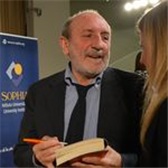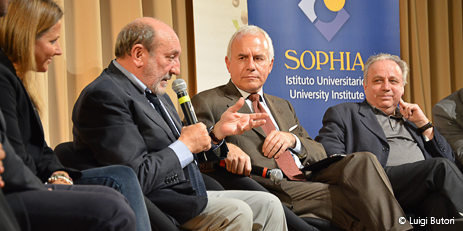“Augustine from Hippo: a heritage, a resource”
Umberto Galimberti and Piero Coda: an extraordinary lesson
The Loppiano Auditorium was packed on 3 October, in an atmosphere of great expectations. On the agenda was an evening dialogue on “Augustine from Hippo: a legacy and resource,” inserted within the framework of the fifth edition of LoppianoLab, promoted by the Sophia University Institute (IUS) and the New City Press, and emceed by Marco Tarquinio, Director of Avvenire, the main Catholic paper in Italy.
Onstage, flanked by a group of IUS students, were two of the most appreciated intellectuals of Italian thought, the philosopher and psychoanalyst, Umberto Galimberti and Piero Coda, philosopher and Dean of IUS, who were described by New City Director, Michele Zanzucchi, as among the “top advocates of Italian creative thought.” .
This was really “an extraordinary lesson” offered within a perspective of dialogue and enriched by stimulating questions addressed by the students regarding the actuality of the philosophy of this “gigantic” figure of the Church and of philosophy.
Despite the different profiles of the two main guests and the outstanding diversity between their evaluations on the works of the Bishop of Hippo, what occurred was not so much a rhetoric duel or even an abstract confrontation detached from daily life, but rather, a remarkable outcome which the art of dialogue is able to produce when knowledge and sharing intertwine in a clear action, open to the light of truth.
Some highlights of the evening were the projection of some brief extracts of the pages of “The Confessions of Augustine,” read by Italian actor, Alessandro Preziosi. Small gems drew all closer to Augustine’s philosophy also through the art of drama.
In the course of the evening, the spotlight focused on the discussion on interiority: the philosopher, Galimberti, gave the Bishop of Hippo credit for having introduced into western culture the concept of the individual person, underlining the dualism of body/soul, as inspired by a religion such as Christianity which assigns a central value to self reflection on one’s own corporeal existence («and the Word was made flesh», wrote John in the prologue of his Gospel).
Piero Coda, on the other hand, without denying that some passages may have seemed ambiguous, evidenced how Augustine is not so much the “author of the theory of the soul,” but the person who “discovered interiority” in the Christian perspective. Interiority is seen as the inner space where man encounters God, and reaches total fulfillment as a bodily and spiritual being, as conveyed in the expression, “withdrawing inwards… so as to transcend also oneself,” which is the starting point of Augustine’s reflections without, however, isolating oneself in a blind introspection but in order to perceive also what lies beyond ourselves. Thus Augustine’s interiority is not empty or obscure, but inhabited by Christ and, therefore, by the relationship with the other: and this where the discussion faces the concept of “relationships,” since God reveals Jesus Christ, who in turn speaks of God as a father and attests to the universal bond of brotherhood.
The third concept which clearly emerged was that of the “city” given that precisely Augustine wrote “De Civitate Dei,” a work that deals with the image of a city which embraces people of all beliefs, open to the quest for a common good rooted in that Utmost Good which is God, through the life of the Gospel.
These three perspectives, therefore, offer new meanings that can direct society today towards a fuller integration. Dissatisfied with the consolation of certainties, and a relentless seeker of truth, in this sense Augustine also on this occasion, has revealed to be a personage who is able to bridge the centuries and speak to the youth and adults of all latitudes. It is a landmark which guides us in our quest for the roots of the “person,” of a people, so as to better grasp the present and also formulate new proposals for the future.
Text by: Mario Agostino
Photos: Luigi Butori




